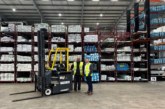
In the September issue of PBM, editor Paul Davies discussed the growing market for modular or off-site housing and considered some of the implications for the merchant sector:
Thanks in no small measure to the ongoing vaccine rollout, the country is tentatively emerging from the worst of the pandemic. And whilst there will undoubtedly be further setbacks along the way, the merchant sector can hopefully take solace from the fact that the construction industry is currently at the vanguard of the nation’s economic recovery.
As we discuss in depth throughout the issue, a combination of factors — not least a number of Covid legacy issues and the reality of Brexit — are creating what has been described as a ‘perfect storm’ of problems to undermine the economic bounceback. However, as with the pandemic itself, the industry is straining every sinew to ensure that disruption is kept to a minimum and service levels are maintained as much as possible.
Yet whilst the merchant sector was able to demonstrate its flexibility from last March, not least in ramping up digital and ecommerce capabilities to meet demand, an altogether different challenge is beginning to present itself through a noticeable expansion of the modular or off-site housing market.
As reported in the Timber Trade Federation’s weekly update on the 13th July, CEO David Hopkins discussed the ‘Building Better’ alliance of 29 housing association and local authorities that are working together to “realise the benefits of modern methods of construction”. Supported by the National Housing Federation and Mark Farmer — the Ministry of Housing, Communities and Local Government’s MMC champion and author of Modernise or Die, the “seminal review” into offsite construction — Building Better has worked with Procurement for Housing to launch “the first MMC framework”, giving its members access to modular housebuilders who can deliver the “highest quality, safe, and sustainable homes”.
“Whilst these numbers are small when set against the Government’s oft-quoted target of 300,000 new homes each year, momentum is gaining for the wider modular and off-site construction market.”
David notes that around 5,300 offsite homes are expected to be built through the framework before 2026, starting with an initial batch of 800. Whilst these numbers are small when set against the Government’s oft-quoted target of 300,000 new homes each year, momentum is gaining for the wider modular market. Homes England, for example, is undertaking a six-year study to monitor the lessons from the construction of 1,800 MMC-built homes, whilst the Government announced in April that at least 25% of properties built through its £11.5bn affordable homes programme will need to be constructed using MMC techniques.
Just in the last few weeks, PBM has received a number of press releases outlining the investment and expansion plans of modular housebuilders — for example, CoreHaus in County Durham has opened a new steel frame factory capable of producing 1,000 homes a year; timber frame construction specialist SO Modular has increased its production capacity by 700% to expand from 500 to 3,500 homes per year on a single shift.
In a related news story, Lewes District Council has appointed offsite manufacturer Boutique Modern to a four-year framework agreement (value up to £110m) to deliver “hundreds” of council homes across the district and more widely in East and West Sussex. With the deal “ensuring certainty of cost”, Council Leader Zoe Nicholson said: “Building more council homes that are sustainable and so much cheaper and greener to run is at the top of our agenda.”
With both the material and labour shortages currently highlighting just some of the ‘limitations’ of traditional bricks and mortar construction, one can see how the clamour for alternatives will only grow. Off-site certainly doesn’t have to mean ‘off limits’ for the merchant sector, but the challenge is one the industry simply cannot afford to ignore.









